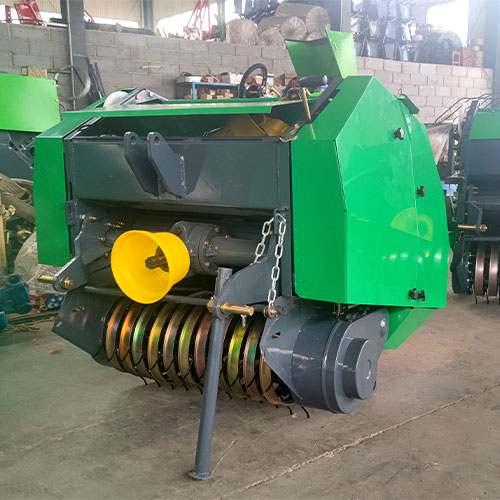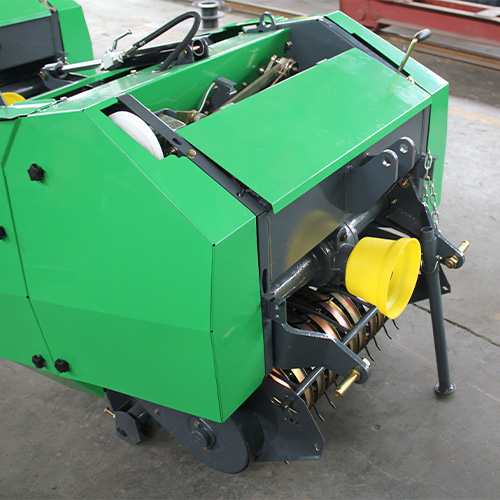Introduction
In modern agricultural practices, maximizing efficiency and profitability is paramount. One crucial piece of equipment that can significantly impact the economic success of a farm is the small round baler. In this blog post, we will explore the economic benefits of investing in a small round baler for your farm, covering its advantages, cost-effectiveness, and potential return on investment.
Increased Efficiency in Hay Production:small round baler

A small round baler revolutionizes efficiency in hay production by optimizing the baling process to a remarkable extent. Its compact design and exceptional maneuverability make it an invaluable asset in navigating through the intricacies of smaller fields and tight spaces with unparalleled ease. Unlike larger balers, which may struggle to maneuver in confined areas, the small round baler effortlessly weaves through narrow pathways and around obstacles, ensuring no corner of the field is left unbaled. This agility translates into significant time savings, as farmers can swiftly move from one section of the field to another without the logistical constraints imposed by cumbersome machinery.
Moreover, the small round baler’s nimble footprint allows it to access areas that may be inaccessible to larger equipment, such as uneven terrain or densely planted fields. As a result, farmers can maximize every inch of available land for hay production, optimizing yield and profitability. In essence, the small round baler’s ability to seamlessly navigate small-scale environments redefines the boundaries of efficiency in hay production, setting a new standard for productivity and performance in modern agriculture.
Reduced Labor Costs
Investing in a small round baler presents an opportunity for substantial reductions in labor costs, a critical aspect of farm management. Unlike traditional manual baling methods or larger balers that often necessitate a team of workers and additional machinery to operate efficiently, a small round baler offers a more streamlined approach. With its user-friendly design and simplified operation, it can be effectively managed by a single individual, eliminating the need for extensive labor resources. This not only minimizes the expense associated with hiring additional help but also reduces overhead costs related to equipment maintenance and operation.
Furthermore, the efficiency of a small round baler translates into time savings, as the need for coordinating multiple workers or managing complex machinery setups is eliminated. This allows farm operators to allocate their resources more efficiently, redirecting manpower to other essential tasks and optimizing overall productivity. Additionally, the versatility and maneuverability of small round balers enable them to navigate through various terrains and field conditions with ease, further enhancing their efficiency and reducing the reliance on manual labor. In essence, investing in a small round baler not only yields immediate cost savings in labor expenses but also contributes to long-term profitability and sustainability in farm operations.
Minimized Crop Losses
Small round balers epitomize precision and consistency in bale formation, meticulously crafting tight, uniform bales that stand as a testament to their superior design. This attention to detail serves as a shield against the capricious whims of weather and the relentless onslaught of pests, safeguarding the integrity of each bale against potential damage or degradation. The compact shape and density of these bales reduce the surface area exposed to external elements, minimizing the risk of moisture infiltration or pest infestation that can compromise hay quality. Consequently, farmers can rest assured knowing that their harvested crops are shielded from the vagaries of nature, preserving their nutritional value and marketability.
By mitigating the risk of spoilage or contamination, small round balers empower farmers to maximize the utilization of their harvest, ensuring that every ounce of hard-earned produce contributes to their bottom line. This translates into tangible gains in revenue and profitability, as fewer losses mean more bales sold and higher returns on investment. Moreover, the consistency and reliability of small round balers instill confidence in buyers, who value the assurance of receiving high-quality, intact bales that meet their stringent standards. As a result, farmers can command premium prices for their produce, further bolstering their financial prospects and enhancing their competitiveness in the market. In essence, small round balers serve as guardians of profitability, shielding farmers from the perils of crop spoilage and delivering tangible gains in yield preservation and market value.
Versatility Across Farm Operations

Beyond their primary role in hay production, small round balers emerge as versatile tools that extend their utility across various facets of farm operations. Their adaptability enables farmers to harness their capabilities for baling a diverse array of crops beyond hay, thereby unlocking additional revenue streams and fostering agricultural diversification. Straw, a byproduct of grain harvesting, finds new purpose as it is efficiently baled by small round balers, transforming what was once considered waste into a valuable commodity for livestock bedding, mulching, or erosion control. Similarly, silage, a staple feed for ruminant animals, can be compactly baled using small round balers, preserving its nutritional value and extending its shelf life for year-round feeding.
Moreover, the versatility of small round balers extends to biomass crops, such as switchgrass or miscanthus, which are increasingly sought after for renewable energy production or biofuel feedstock. By efficiently baling these biomass crops, farmers can tap into burgeoning markets and capitalize on the growing demand for sustainable energy sources, thereby diversifying their agricultural enterprises and future-proofing their operations against market fluctuations. The ability of small round balers to adapt to a wide range of crops not only enhances revenue potential but also fosters resilience in the face of changing market dynamics and evolving consumer preferences. Additionally, by diversifying their product offerings, farmers can reduce their reliance on any single crop and spread their risk across multiple income streams, thereby insulating themselves against potential downturns in specific markets or sectors. In essence, the versatility of small round balers transcends traditional boundaries, opening up new avenues for revenue generation and empowering farmers to explore innovative opportunities for agricultural diversification and sustainability.
Long-Term Cost Savings
While the initial investment in a small round baler may seem significant, its long-term cost savings can far outweigh the upfront expense. With proper maintenance and care, a small round baler can last for many years, providing a reliable and cost-effective solution for hay production and other baling needs.
| Aspect | Description |
|---|---|
| Initial Investment | While the upfront cost of a small round baler may be significant, it is a one-time expense. |
| Longevity | With proper maintenance and care, a small round baler can last for many years, providing durable service. |
| Maintenance Costs | Routine maintenance costs are relatively low compared to larger equipment, contributing to overall savings. |
| Labor Savings | Operational efficiency of small round balers reduces labor requirements, leading to additional cost savings over time. |
| Reduction in Crop Losses | By producing tight, uniform bales, small round balers minimize crop losses, resulting in increased revenue. |
Conclusion
In conclusion, investing in a small round baler for your farm can yield significant economic benefits in terms of increased efficiency, reduced labor costs, minimized crop losses, versatility, and long-term cost savings. By carefully considering the advantages of a small round baler and its potential impact on your farm’s bottom line, you can make an informed decision that leads to greater profitability and sustainability in your agricultural operations.
FAQ
Q: What are the advantages of using a small round baler over other types of balers?
A: Small round balers offer several advantages, including compact size, maneuverability in tight spaces, reduced labor requirements, and versatility across different crop types. Additionally, small round balers are often more cost-effective for small to medium-sized farms compared to larger balers.
Q: Can a small round baler handle heavy-duty baling tasks effectively?
A: While small round balers are designed primarily for small-scale operations, many models are equipped with features that allow them to handle heavier baling tasks with ease. However, it’s essential to select a model with sufficient capacity and durability to meet the specific requirements of your farm.
Q: How do I choose the right size and model of small round baler for my farm?
A: When selecting a small round baler, consider factors such as the size of your farm, the volume of crop production, and the types of crops you intend to bale. Additionally, evaluate the specifications and features of different models, such as bale size, pickup width, and net wrapping capabilities, to ensure they align with your needs and preferences.

